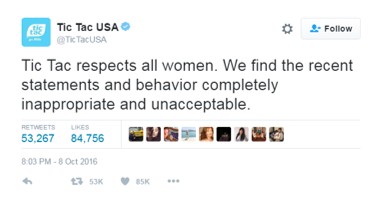Since the early 2000’s, and the explosive development of social media platforms, the Internet has become a new dimension of the public sphere “to which all citizens should have access”, according to Habermas, 1989, as “a forum for the formation of public opinion.” Part of the attraction of social media platforms such as Facebook, Twitter, and YouTube is arguably that that the ‘average’ person – being someone with little or no advanced computer skills – can be successful using them to generate content.
 Content – being anything from a 140 character ‘tweet’ on the online social network ‘Twitter’, to a video of puppies uploaded to ‘YouTube’ (a video content distribution forum created in 2005) – can not only be created easily, but can be accessed with something as simple as a smartphone and can be easily linked between different web-pages, making it one of the most efficient and versatile forms of mass communication.
Content – being anything from a 140 character ‘tweet’ on the online social network ‘Twitter’, to a video of puppies uploaded to ‘YouTube’ (a video content distribution forum created in 2005) – can not only be created easily, but can be accessed with something as simple as a smartphone and can be easily linked between different web-pages, making it one of the most efficient and versatile forms of mass communication.
Henry Giroux, an American cultural critic and one of the founding theorists behind the concept of critical pedagogy, best summarised the impact of the development of social media when he said:
“The Internet, in all its variety, has effectively re-constituted – especially amongst young people – how social relationships are constructed; and how communication is produced, mediated and received. Under such circumstances, state power becomes more porous and there is less control and regulation as to what is said. Text messaging, Facebook, Twitter, YouTube and the internet have given rise to a reservoir of political energy that poses a new relationship between the new media technologies, politics, and public life.”
Suffice to say that the influence of social media is making huge changes in combating the issue of political apathy by providing new ways to stimulate engagement in politics through allowing politicians and political parties to communicate faster (and in a more targeted manner without the need of mass media) with potential voters, and vice versa.
No longer can it be said that the traditional forms of media communications have “significant influence over voting behaviour at election time” (Joyce, 2010), as the rise in popularity and diversity of social media has allowed what is known as ‘the partisan filter of politics’ to be lowered, thus increasing the range of political parties and ideals available to be disseminated by the public. This changing face of political campaign marketing has been seen on both sides of the Atlantic, but most of all in the 2008 Presidential Election campaign of (now President) Barack Obama, whose use of social media raised over half a billion dollars in online donations, and labelled that year as the first real “social media election”.
Obama’s embracing of social media platforms is largely thought to be a part of his appeal, and his digitally savvy campaign strategy is argued as being one of the key reasons he was able to take his seat in the White House. But, his engagement didn’t just stop once he achieved office. Instead, during his 2012 re-election campaign Obama averaged 29 tweets per day (compared to Mitt Romney’s 1 tweet per day) which, since 2008, has spurred his Twitter following to have grown from approximately 100’000 to 19 million, and his Facebook fanbase from 2 million to 28 million.

Here in the UK, social media has had a similarly profound effect on our political sphere, quickly becoming a vital campaign platform that is re-shaping the way elections are won and lost, how policy is made, and how people get involved in formal and informal politics. Social media strategies by political parties however vary greatly in their approaches, from single-issue campaigns to established political party Facebook accounts with strict control over the content.
What they have in common though, is the idea of a direct, free and easy involvement (or engagement) with the public via the publication and promotion of regular updates and information as well as the active participation of members. Party leaders and their MPs, for example, now commonly have Twitter accounts, giving them the ability to reach their advocates and the general public within a matter of seconds through regularly posted messages or purchased, promoted advertising.

Additionally, social media has become a leading aspect in the development of the multi-step model of communications, giving reporters and other social influencers the opportunity and platforms to voice their opinions as often and loudly as they like as they record, disseminate and analyse every detail of the UK political sphere, creating a 24/7 news cycle.
The downside of this however is that it has inadvertently given rise in media coverage and popularity of previously socially frowned upon radical right-wing parties, such as the English Defence League and the UK Independence party, who have employed social media to rapidly grow and create a significant political and social impact over the past few years.
The Oxford Internet Survey shows a very definite shift toward online political activism, with the percentage of people who signed an online petition doubling to 14 % between 2007 and 2011 compared to that of those doing this offline falling from 20% to 18% within the same time-frame. Recent research by Demos into the Facebook groups of radical right-wing parties also showed that members and online supporters of these groups are particularly active in comparison to the average ‘fan’, with around 2/3 voting for that party in the last general election, and 1/4 having been involved in a demonstration or strike within the last year – a figure considerably higher than the national average.
One potential reason for this has been argued that online political participation increases individuals’ political efficacy (the confidence they have in feeling they can influence politics). This is something which has been shown to have a strong correlation within research by the Oxford Internet Institute, which suggests that those with low political efficacy are less likely to participate overall in engaging in politics, and when they do participate, it is entirely offline (10% offline to 0% online). This is compared to 60% of internet users with high political efficacy participating politically online.
Personally, I love the way that social media allows not only better engagement with political parties and politics in general, but also a greater scrutiny (and mockery) of MPs and their views. Twitter for example is a common tool in this with, for example, Conservative MP Karl McCartney being left red-faced last year after being caught ‘favouriting’ an image of a naked and tied-up woman with a pillow over her face by the Labour candidate he was standing against in the next general election.

Understandably, Mr McCartney quickly explained the situation: He’d been hacked, as he “doesn’t use the ‘fav[sic] button”… despite having a total of 56 ‘favourited tweets’ in the above screenshot…. Methinks that was some quick (albeit not very logical) thinking.
 The tweet and its associated image (which has since been removed) stated bluntly: “If I offered you a bowl of Skittles and told you three were poisoned, would you take a handful?”, garnered nearly 30’000 mentions by that evening. The majority of responses, however, were (thankfully) disgusted by the comparison and poked fun at Trump’s campaign.
The tweet and its associated image (which has since been removed) stated bluntly: “If I offered you a bowl of Skittles and told you three were poisoned, would you take a handful?”, garnered nearly 30’000 mentions by that evening. The majority of responses, however, were (thankfully) disgusted by the comparison and poked fun at Trump’s campaign. For all those who haven’t seen the latest video release showing Trump claiming in 2005 that he’s “got to use some Tic Tacs, just in case [I] start kissing her,” (referencing Days of Our Lives actress, Arienne Zucker), continuing to say, “You know I’m automatically attracted to beautiful — I just start kissing them. It’s like a magnet.”
For all those who haven’t seen the latest video release showing Trump claiming in 2005 that he’s “got to use some Tic Tacs, just in case [I] start kissing her,” (referencing Days of Our Lives actress, Arienne Zucker), continuing to say, “You know I’m automatically attracted to beautiful — I just start kissing them. It’s like a magnet.”
 The selection boxes – adorned with famous Soviet-era-styled propaganda posters – are stylised to include biting couplets (such as “Don’t mouth off, gentlefolk dear/That Obama’s bound to hear!” blazoned beneath the image of a World War II female factory worker warning against gossip), and patriotic slogans like “For Western currency we have no need/A golden ruble – at full speed!” – used to emphasise the perceived power of Russia’s resource-based economy.
The selection boxes – adorned with famous Soviet-era-styled propaganda posters – are stylised to include biting couplets (such as “Don’t mouth off, gentlefolk dear/That Obama’s bound to hear!” blazoned beneath the image of a World War II female factory worker warning against gossip), and patriotic slogans like “For Western currency we have no need/A golden ruble – at full speed!” – used to emphasise the perceived power of Russia’s resource-based economy.





